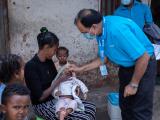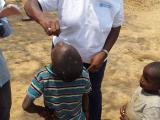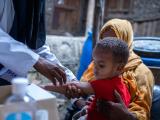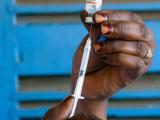Jan 3, 2013 (CIDRAP News) – In the wake of recent killings of polio vaccinators in Pakistan, some questions are being raised about the all-out push to eradicate polio, but the World Health Organization (WHO) says the world can't afford to back off on the eradication drive now.
"We've never had so few cases or such a small footprint of the virus, so we know this opportunity is not going to come back," Sona Bari, the WHO's polio eradication spokesperson, told CIDRAP News. "We've never been here before. It's now or never."
With the dawn of 2013, the global eradication campaign missed its latest official goal of eradicating polio by the end of 2012. That milestone came shortly after the killing of nine polio workers in Pakistan a few days before Christmas. Yesterday seven Pakistani aid workers were shot in an attack that some said may have been aimed at the anti-polio drive.
Polio vaccination efforts in Pakistan fell under suspicion in 2011 after the CIA used a fake hepatitis vaccination drive in its effort to track down Osama bin Laden. The Taliban and other militant groups are suspected to have perpetrated the recent attacks.
In part because of these developments, one expert contacted by CIDRAP News expressed doubt about moving forward with the eradication drive, while others echoed the WHO's sentiments about the need to push forward.
Pakistan is one of three countries in which polio remains endemic, along with Nigeria and Afghanistan. The global tally of wild poliovirus cases in 2012 is 215, well below the 650 reported in 2011 and 1,352 in 2010, according to the Global Polio Eradication Initiative (GPEI). The 2012 number may rise to some degree, however, as remaining patient samples collected in 2012 are tested.
The latest GPEI update shows that Pakistan had 57 and Afghanistan had 35 wild poliovirus cases in 2012. Nigeria, the only country where cases increased in 2012, had 118.
Those numbers are tiny in comparison with the annual tally of about 350,000 cases when the eradication drive was launched in 1988. But polio has proved very difficult to stamp out, for a variety of reasons, and the projected eradication date has been moved back repeatedly.
Bari said the WHO is now looking at 2014 as the new target for eradicating the disease. "The eradication endgame strategy going to the [WHO] Executive Board in January aims for stopping polio transmission by the end of 2014," she said.
Last May the GPEI released an emergency action plan to stop polio in the three remaining countries where it is entrenched. The group, a project led by the WHO, Rotary International, the US Centers for Disease Control and Prevention (CDC), and the United Nations Children's Fund, said the eradication drive was at a tipping point.
Questioning the campaign
Given the high cost of polio eradication and the drain on other global health efforts, questions have been raised before about whether the campaign should continue.
One veteran global health campaigner who now questions the all-out eradication effort is D.A. Henderson, MD, MPH, who led the successful drive to eradicate smallpox in the 1970s. He cited concerns much broader than just the recent shootings in Pakistan. He is a distinguished scholar at the Center for Biosecurity at the University of Pittsburgh Medical Center and a professor of public health and medicine at the University of Pittsburgh.
Henderson had long been a skeptic of the eradication effort, but he said that 2 years ago he changed his position and applauded it in view of new strategies adopted and a "flood" of new resources provided. Those included the Independent Monitoring Board (an external auditing group), participation by Bill Gates, and many commitments by national and international officials.
At that time, he said in e-mailed comments to CIDRAP News, he thought it reasonably likely that transmission of wild poliovirus could be stopped at least by the end of 2013.
Now the campaign is at "an extremely critical stage," with Dec 31 having marked the original eradication target date for the third of the WHO's all-out 3- to 4-year campaigns to stop wild poliovirus, Henderson said. He noted that international funding of the program now tops $1 billion a year.
He acknowledged India's success in eliminating wild polio strains in 2012. "However, continuing failures in very different, very large areas of countries on two different continents despite all that is being invested is ipso facto evidence that the time has come to accept the fact that even with the optimum in resources, tools and support that can reasonably be provided, eradication is not possible at this time," he wrote.
"The time has come to accept and plan for effective, far less costly polio control activities integrated into national programs for immunization and preventive health services," Henderson said. He added that the attacks in Pakistan provide "a very salient, pertinent" additional reason for changing the policy.
He called the situation "a highly regrettable ending although all credit [is due] to those who have been engaged and have helped lay a groundwork for future immunization programs."
The WHO's stance
But Bari said the WHO's experts and governments believe that eradication is still feasible, given the very low number of cases this year and the risks of giving up.
If polio were to spread from Nigeria to a neighboring country like Mali or from Pakistan to central Asian countries, as has happened in the past, it might not be possible stop it, she said.
Further, in many parts of the world there are now cohorts of adults who are susceptible to polio because they were never immunized either by exposure or immunization, Bari said. As a result, outbreaks in such places can cause high fatality rates, as occurred in Tajikistan, China, and the Republic of Congo in recent years.
She cited a 2007 modeling study that projected that if the world shifts from the intense eradication effort to a control strategy based on routine immunization, in 10 years the polio toll will rise to about 200,000 cases per year. The study was done by Kimberly Thompson, ScD, of Kid Risk Inc., an Orlando, Fla., research organization that focuses children's health issues, especially polio, rubella, and measles.
"Essentially it's a disease that you can't control with just routine immunization campaigns," Bari said.
Integrating polio immunization with other immunization programs has been helpful, "but no country has stopped polio transmission with routine immunization," she added. "Even in the US there were mass vaccination campaigns."
Once polio is eradicated, inclusion of polio in routine immunization programs will be essential for keeping the disease from coming back in case of a lab accident or similar mishap, especially in high-risk countries, Bari said.
"That's a very valid point that many experts raise, that routine immunization is essential to keeping polio eradicated," she said. The eradication campaign has built up much health infrastructure in the affected countries, and "we need to make sure it survives and is beneficial to broader programs," she added.
Other support for eradication efforts
Other global public health experts reached by CIDRAP News shared Bari's view that to call off the eradication push would open the door for a major resurgence of polio.
Observing that cases in 2012 were the lowest ever, Walter Orenstein, MD, associate director of the Emory Vaccine Center at Emory University in Atlanta and former director of the CDC's National Immunization Program, said in an interview, "The problem with abandoning the goal is it's very likely that polio would resurge, and all of the extensive efforts to eradicate it are really keeping the lid on."
As an example of what can happen, he cited Tajikistan. The country was declared polio-free in 2002 and had no cases for several years, but a false sense of security set in. As a result of polio imported from India, Tajikistan had 460 cases in 2010, and the disease spread onward to Russia, Turkmenistan, and Kazakhstan.
Orenstein said it's appropriate that concerns are being voiced in the wake of the shootings in Pakistan. "The issue is, can we work on the diplomatic side and gain community involvement to overcome biases [against the immunization program]?" he said.
He cited the reversals to polio efforts in northern Nigeria in 2003 and 2004. Some groups there spread rumors that polio vaccines caused sterility, HIV infection, and other problems, with the result that vaccinations were halted for about 11 months in large parts of northern Nigeria.
But in time, polio program leaders managed to build the political will to resume the vaccination drive by convincing provincial authorities of the need for it, Orenstein said. He added that he thinks overcoming the opposition in Pakistan is possible, "but I don't want to minimize what has to be overcome."
He said he has heard talk of moving the eradication target date back several years, but nothing specific. "The big concern to me is to try and move as quickly as possible. We're already 13 years behind the original goal [of 2000]. The longer it takes, it becomes harder to sustain the kind of commitment needed for the campaigns."
Eradicating polio involves "a lot of issues" that didn't exist with smallpox, said Orenstein, who participated in the smallpox battle. "Nevertheless, we're 99.9% of the way there. . . . If we give up, we're likely to have major outbreaks of polio around the world."
Among the complications with polio is the problem of vaccine-derived viruses that can mutate to become virulent. The mass polio campaigns use trivalent (three-strain) oral vaccines with live attenuated, or weakened, viruses.
Under conditions of low immunization coverage, Orenstein noted, a vaccine virus can reproduce in the intestines, spread, and in rare cases become virulent like wild viruses. The problem happens most often with poliovirus type 2.
Bari said that, because of this risk, the WHO's Strategic Advisory Group of Experts on immunization (SAGE) has recommended that the WHO start considering an eventual switch from a trivalent to a bivalent oral vaccine, covering types 1 and 3. "Clearly type 2 polio is a much greater risk" regarding vaccine-derived viruses, and wild type 2 viruses have largely been eliminated, she said.
But if type 2 is dropped from the oral vaccine, populations will still need protection against vaccine-derived type 2 viruses, Bari said. Consequently the WHO is considering using an inactivated polio vaccine for type 2. The hitch with that is that it's much more costly than oral vaccines and is injected, requiring trained health workers to administer it.
"It needs to be a lot cheaper," Bari said. Researchers are looking for ways to lower the cost, such as reducing the dose or giving the vaccine intradermally.
Another expert who believes that the eradication must continue at full throttle despite the troubles in Pakistan is Neal Halsey, MD, director of the Institute for Vaccine Safety at the Bloomberg School of Public Health at Johns Hopkins University.
"The shooting of polio eradication workers is obviously a major setback for the eradication effort and for public health in general," Halsey said. "Every effort must be made to protect immunization workers. In virtually all the other countries of the world where there has been conflict, leaders on both sides of the conflict have come to endorse polio immunization and the eradication effort. I certainly hope that this can be accomplished in Pakistan.
"The eradication effort should continue, and I am optimistic that eventually the problems in Pakistan will be addressed effectively. We have come too far in the eradication effort to stop the program now."
Bari said that the history of the eradication campaign has shown that despite all other circumstances, "people still do want to protect their children."
"Pakistan is a very, very difficult situation, including the fact that the war on terror complicates the relationship with Pakistan," she added. "The government is very determined and the NGO [nongovernmental organization] partners are very committed to this."
See also:
May 25, 2012, CIDRAP News story "Emergency plan unveiled for major push against polio"
Jan 12, 2012, CIDRAP News story "Polio: Good news from India, but global concern"
Jun 18, 2008, CIDRAP News story "Coalition declares 'final push' to end polio"
Polio case numbers
Thompson Lancet 2007 study abstract




















